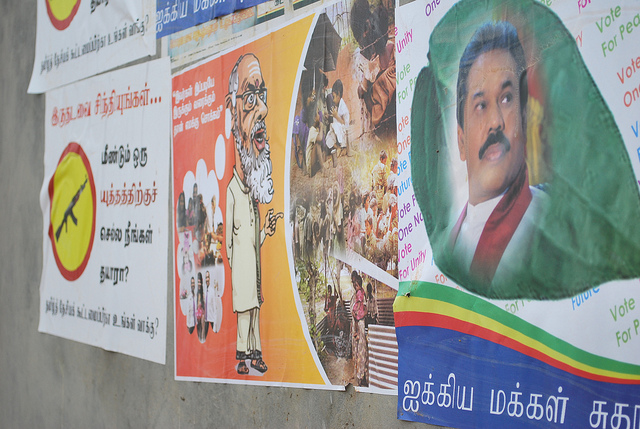"To win the people, cook savory that pleases them"
December 17th, 2014 The public is caught up in debate over issues related to the upcoming election, but Madusha Erandi, 22, a Commonwealth Correspondent from Sri Lanka, argues it is important to keep basic societal values as the focus of attention.
The public is caught up in debate over issues related to the upcoming election, but Madusha Erandi, 22, a Commonwealth Correspondent from Sri Lanka, argues it is important to keep basic societal values as the focus of attention.
Sri Lanka, a country that operates under an executive presidency system, is experiencing higher-level political revolutions. Along with the presidential election, there has been much news exchanging among society’s various groups. Different people hold diverse political ideologies, where dialogues have been created about Sri Lankan development schemes.
Unlike other election seasons, this term is a contrast where many party crossings have taken place, drastically increasing the competitive nature of politics. However much political revolutions take place within the country, the social norms that preserve a country’s democracy should be defended. It is worthwhile to consider how far these values have been preserved.
We recognize rule of law, the constitution, and democracy as social and political norms that make a better society. Under those umbrellas, we recognize individual autonomy, media freedom, human and women’s rights, which give effect to those concepts. Democracy invests the people with the supreme power. Increasing the number of people involved in the decision-making process puts people closer to the administrative procedure. That enhances direct democracy, ensuring that people’s rights are duly respected.
Taking Switzerland as an example where people of the cantons are more powerful than the federal government in their decision making, it is ranked one of the best democracies in the world. How can this be related to Sri Lanka? We have universal franchise, giving everyone voting powers to appoint their representatives. It should be the free will of people that is not altered in any way, or coerced by any sides. Regardless of the party of the elected president, since inception of the executive presidency we have seen how presidents have used their overwhelming powers to make people inclined toward them. When the nominations are chosen for an election, despite who the president is, both candidates come to a similar position where both of them have similar powers and neither exceeds the other. Nevertheless, when the existing president asks for another term of presidency, using presidential powers he can give privileges to people during election season.
Media freedom, which goes along with people’s right to information, has been limited to a considerable extent, confining people’s choice. Why do I say this? Channels that are telecast lack impartiality. There are very limited instances of channels broadcasting impartial information about both sides. Moreover, most of the rural areas of the country that do not have adequate signal strength see only one or two channels, which favour single party politics. Thus, the question arises how people will freely decide which representative will fulfil their interests. There are restrictions on many channels that broadcast other candidates’ campaign information. We see how people’s choice, which is a vital characteristic of democracy, has been restricted in many aspects. This does not pave the way to a free and fair election. Norms of democracy and individual liberty have been diminished, threatening the country’s good governance.
Another aspect that should be considered is election violence, which is reported from many areas of the island. Supporters of political parties having a grudge against each other can engage in physical violence, which is a threat to national security. There have been many reported cases of murders – attacks that are a black mark in the political arena of the country.
Environmental pollution happens due to campaign procedures. The polythene banners and other cutouts candidates use for publicity do not give any positive effect. We, being a country with precious natural beauty, will degrade that quality through having to dispose of large amounts of polythene.
Money which is spent on banners, cutouts and posters is public money needed to fulfil necessities. If the aforementioned amounts could be invested in the health sector, education and public service there could be many positive outcomes, and the real service which should be rendered to the people by their representative would be satisfied. It is important to note that a real candidate of the people is not known in posters, but of course in people’s hearts.
In conclusion an election should be held respecting the basic societal norms, which everyone can live up for a better future.
photo credit: Vikalpa | Groundviews | Maatram | CPA via photopin cc
………………………………………………………………………………………………………………
About me:
I am determined and ambitious; ready to take up any challenge. A former journalist, I’m studying law at University of Colombo and doing freelance writing. I believe the youth is the fruitful future of any country and the positive anticipation of the developing world.
I love observing people, their nature and writing about them. I am a wannabe photographer. I swim, do athletics, and sing. I consider myself as a genuine social worker. Writing is simply my passion.
………………………………………………………………………………………………………………
Opinions expressed in this article are those of the author and do not necessarily represent the views of the Commonwealth Youth Programme. Articles are published in a spirit of dialogue, respect and understanding. If you disagree, why not submit a response?
To learn more about becoming a Commonwealth Correspondent please visit:
http://www.yourcommonwealth.org/submit-articles/commonwealthcorrespondents/
………………………………………………………………………………………………………………




